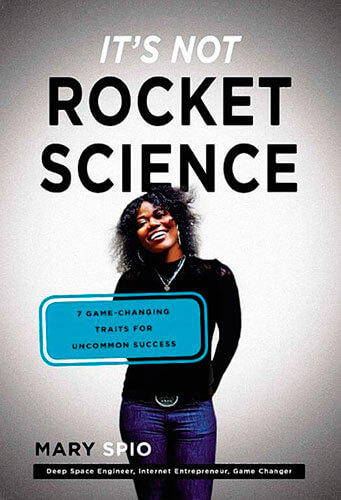“It’s Not Rocket Science” by Mary Spio
c.2015, Perigee
$24.95 / $27.95 Canada
244 pages
Your father always told you to reach for the stars.
Be the best you can be, he said. Never let obstacles get in your way. Strive for success and challenge yourself – all excellent advice, but how can you harness astronomical success in this, or any economy? In the new book “It’s Not Rocket Science” by Mary Spio, you’ll find some stellar ideas.
Back when you graduated from high school or college, you were expected to find a job, work hard, and move up the ladder until it was time to retire. The “new dream,” though, is to find work that will allow you to create “a lifestyle of freedom by defining success your way…”
Mary Spio, as it turns out, lives that statement.
Born in Syracuse, New York, Spio’s family moved back to their native Ghana when she was a little girl. She grew up hearing her father’s urge to reach for the stars and she took that advice to heart: as a teenager, she came back Stateside, finished high school, joined the Air Force and went to work for NASA. Her passion, however, lay elsewhere and she’s now a serial entrepreneur and “Game Changer.”
Game Changers are a new “tribe” of businessperson, says Spio. They “change our world in some way… by altering the way we think… work or the way we live.” Not only do Game Changers ignore the rules, but they ignore conventional, old-school advice, too. Think Copernicus, says Spio, Bill Gates, or Oprah. They share “seven key traits” with all Game Changers.
A big imagination is at the top of the list of Game Changer attributes. Imagination leads to inquisitiveness, creativity and ideas, and “curiosity drives action.”
Game Changers have a deep passion for their work, and they live that passion in their everyday lives. Their compassion drives them, and their days are spent “doing something meaningful.” They possess laser-focus in their actions and their “relentless hustle.” Game Changers are audacious, they make friends with risk and fear, and they have “pit bull tenacity.” Above all, they leave a “mark on the world.”
Lately, it seems, the math is simple: idea + passion + desire for change = success. And with “It’s Not Rocket Science,” that adds up nicely.
At first, though, on the surface, it doesn’t appear that there’s much new here. Author Mary Spio essentially reiterates a lot of what you’ll find inside similar books. We’re encouraged to follow blueprints comparable to what other volumes espouse… but look closer. The twist is in illustrative stories Spio uses: they’re different, more approachable, more common-man in their scope. Here, impossibly high-positioned, super-famous CEOs are not held up as the only examples of achievement. That gives readers a sense that, indeed, mega-success truly is attainable by anyone.
In the end, I liked this book quite a bit because of the above and because it makes entrepreneurship sound fun again. And if that’s the kind of approach you need to become the next sensation, then “It’s Not Rocket Science” is out of this world.


























